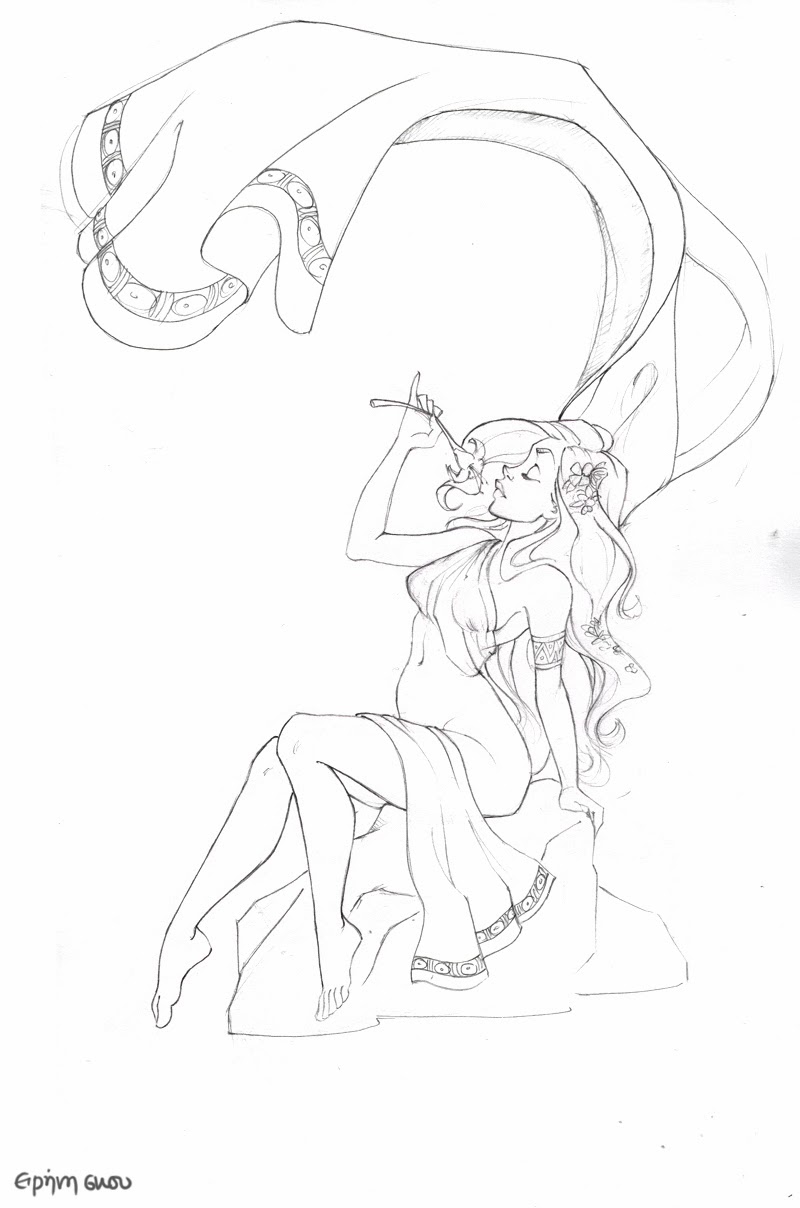Greetings everyone!
For the sake of our sanity (and trying to set realistic goals), we have decided that we will be posting an entry every Wednesday (Thursday if our schedules are too tight), covering various topics from ancient greek mythology (for the most part we’ll be talking about the Olympians and some of our favourite mythological couples), and a second one sometime during every weekend, when we'll be talking about all things Eros and Psyche: how's the project coming along, fun facts and everything related to it.
Before we go any further, here’s an insight of how we plan things:
Eirini: “What are you planning to write about on Wednesday?”
Me: “I don’t know; whatever you feel like drawing.”
…because we’re professional like that! :-p
So, with that in mind, today we’ll be talking about Zeus and Hera; King and Queen of gods and men, brother and sister, husband and wife.
 |
...over a year ago...
(time certainly flies) |
Their parents, Cronus and Rhea, had six children together. Cronus, because of an oracle that said that he would be overthrown by his own son, like he had done to his father (history tends to repeat itself after all), swallowed all his children as soon as they were born.
Rhea though, was to put a halt to his plan; when she was about to give birth to Zeus, she escaped to Crete and gave birth to him there; She hid him in a cave, and left him in the care of a goat, Amalthia, until Zeus reached adulthood. Rhea returned home to Cronus, handing him in a rock covered in swaddling clothes.
When Zeus reached manhood, he presented himself to Cronus and forced him to disgorge his siblings. After overthrowing him, he and his brothers drew lots and shared the world; Zeus got the sky and air, so it’s only natural that he’s considered to be the god of sky and thunder.
 |
Clearly, Zeus is a hottie! (sometimes I think I have too much fun with captioning :-p )
And I simply love the sketch on the top right hand corner where he is being chased by Hera. :-) |
Zeus is also notorious for him numerous erotic escapades, which resulted in countless offspring. Hera, who was very beautiful (for some strange reason though, that fact is usually overlooked, and people tend to remember her only as strict and solemn) had caught his attention. He began pursuing her, but she kept turning him down (too much of a womaniser for her taste).
 |
| Beautiful, solemn and majestic! |
Of course, that didn’t stop Zeus; he decided on a different approach, and, disguising himself as a rain-soaked cuckoo, landed to Hera's feet. She felt sorry for the bird and sheltered him to her bosom in an attempt to warm and dry him. Zeus immediately returned to his true form and claimed her as his own. She succumbed to his advances and, full of shame, agreed to marry him.
The fact that he had married Hera for love, did not Zeus stop from having affairs, which was the main cause of dispute between them.
Zeus, and his lovers and offspring as well, often paid the price of Hera’s jealous and vindictive nature; not that she’s entirely to blame though; Zeus was far from an ideal husband. His “authority” made him think that he could get away with being disrespectful towards the goddess of marriage but was he ever wrong!
Hera might be Queen of gods and men, but that doesn’t mean she held as much power as Zeus; not even close. Still, she was well respected by gods and men alike; (even Zeus himself was known to seek her opinion on various occasions), but in the end, she was just the king’s wife; the final word was always his.
 |
| Hera in all her glory! |
Lastly, both Zeus and Hera play a part in our myth.
Hera, despite the fact she’s the goddess of women and marriage, is not as helpful as she should be (given her role) towards Psyche, because she wants to stay in good graces with Aphrodite.
Zeus on the other hand, is quite helpful towards Eros and Psyche, using his power in their favour and convincing Aphrodite to leave them in peace.
After all, if Eros is happily married to Psyche, shooting arrows towards his direction will be the last thing on his mind. :-p














